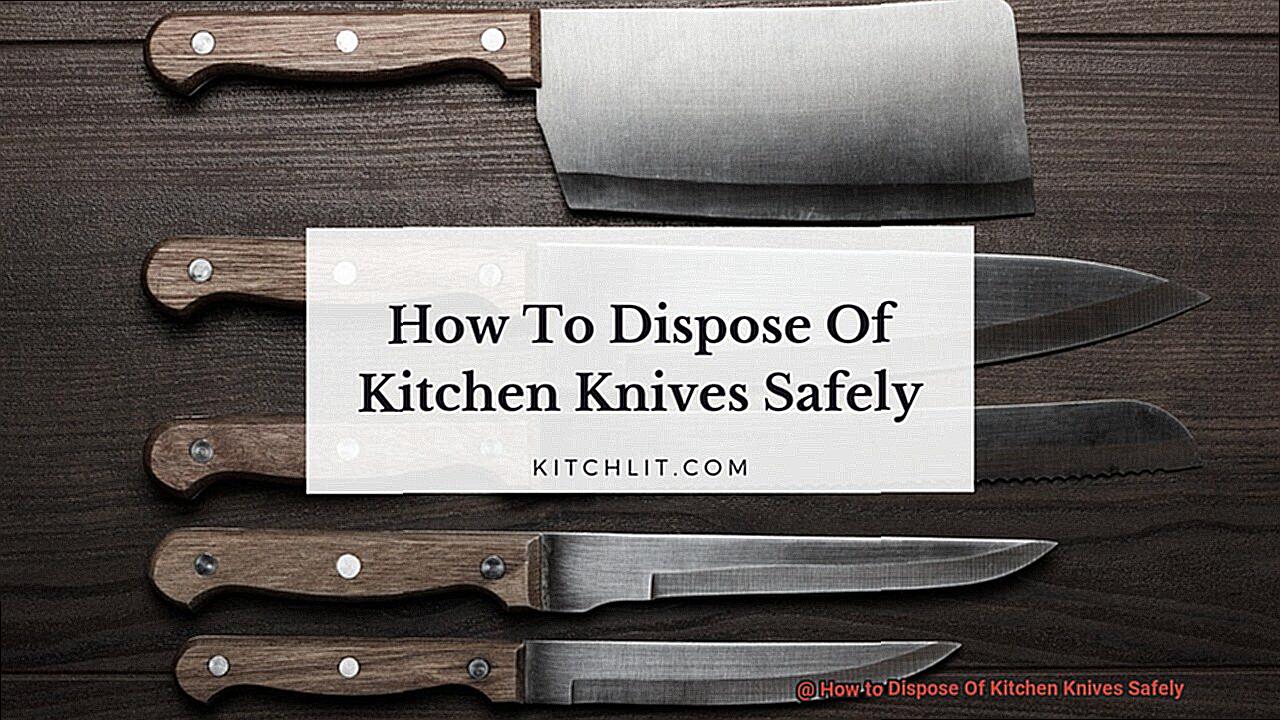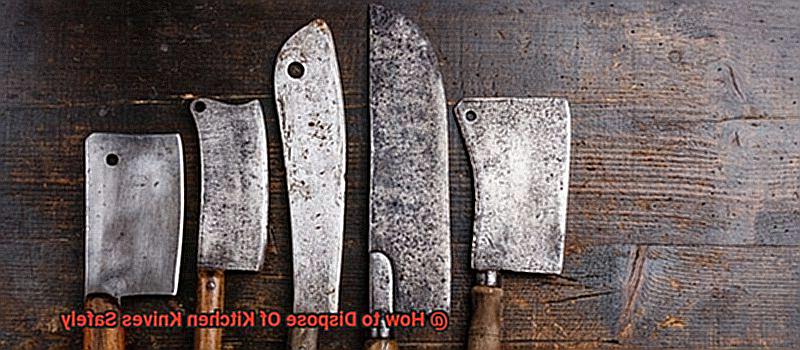Are you upgrading your knife set or adding an extra one to your kitchen?
If yes, then you might be wondering what to do with your old kitchen knives. The most common thought is to toss them in the garbage, but it’s not the safest way to dispose of them.
Improperly disposing of knives can pose a risk to yourself and others. Knives that end up in landfills can hurt waste collection workers, damage machinery, and harm the environment.
Therefore, it’s crucial to know how to safely dispose of kitchen knives. In this blog post, we will explore some safe and sustainable ways of getting rid of old kitchen knives.
We’ll discuss recycling options, donating methods to local charities, and how to deal with dull or damaged blades. Additionally, we’ll provide you with the best techniques for cutting and discarding blades.
In this article, you’ll have a clear idea of how to dispose of your kitchen knives responsibly while keeping yourself and others safe from harm.
Assessing the Condition of Your Kitchen Knives
Contents
First, inspect the blade for any signs of damage. Chips, rust, or corrosion can all be indications that it’s time to part ways with your trusty kitchen companion.
Don’t take any chances – dispose of it immediately if it’s beyond repair.
Next, check the handle for any cracks or splits.
A damaged handle can affect your grip and increase the risk of injury.
In some cases, the handle can be repaired, but if it’s beyond repair, consider getting rid of the knife.
It’s also important to consider how often you use the knife and whether it’s become dull over time. A dull knife requires more force to cut through food, increasing the risk of slipping and injuring yourself.
Before disposing of a dull knife, consider sharpening it.
Lastly, take note of the type of material your knife is made from.
Stainless steel knives can be recycled, while ceramic knives cannot. Proper recycling methods for your specific type of knife should be researched to ensure safe disposal.
If your knives are in good working condition but you no longer need them, donating them to a local charity or thrift store is a great option. However, if they’re broken or damaged beyond repair, using a knife disposal container or wrapping them tightly in newspaper or cardboard before throwing them away is essential.
Donating Your Kitchen Knives
Donating your kitchen knives is a sustainable and responsible way to dispose of them while also making a positive impact in your community. Before donating, ensure that your knives are in good condition and sharpened.
No one wants a dull or broken knife, so take the time to inspect them thoroughly. Once you’re confident that they’re in good shape, it’s time to find a reputable charity to donate them to.
There are several organizations that accept knife donations, such as local food banks, homeless shelters, and culinary schools. However, it’s essential to call ahead and ask if they accept knife donations and if they have specific guidelines or requirements for accepting them.
When preparing your knives for donation, wrap them securely in paper or cloth to prevent any accidents during transport.
It’s important to label them as sharp objects so that the recipient is aware of the contents.
Using a Knife Disposal Container
These containers are designed specifically to hold sharp objects, such as knives, securely until they can be properly disposed of. Made from sturdy materials like plastic or stainless steel, they typically feature a locking mechanism to prevent accidental access.
When it comes to using a knife disposal container, safety should always come first. Make sure to follow the manufacturer’s instructions closely, ensuring that the container is securely locked and that the knives are placed inside with the blades facing downwards.
This simple step can prevent any accidental injuries while handling the container. Luckily, knife disposal containers are readily available.
You can pick one up at a hardware store or online retailer, and they come in a range of sizes to accommodate different types of knives, including serrated and chef’s knives. When selecting a container, ensure it is made from durable materials that won’t crack or break over time and is large enough to fit all your knives.
But what happens when your knife disposal container is full? Proper disposal is key.
Check with your local waste management facility to see if they accept sharp objects like kitchen knives. If not, you can also check with local recycling centers or metal scrapyards to see if they will accept them.
Alternatively, some communities offer special collection events for hazardous materials like sharp objects. Using a knife disposal container is an easy and safe option for disposing of kitchen knives.
Wrapping the Knives Before Discarding
Disposing of old kitchen knives can be a tricky task, but it’s critical to do it properly to ensure everyone’s safety.
Simply tossing them in the trash without proper care could cause serious harm to sanitation workers and others who may come into contact with them. That’s why wrapping your knives before discarding them is a must.
To achieve this, consider wrapping the blade with newspaper or cardboard to create a protective layer around it. This will prevent anyone from getting injured if they accidentally come into contact with the blade.
Another option is to use a specialized knife disposal container.
These containers are designed specifically for disposing of sharp objects and have a locking mechanism to prevent access once the knives have been deposited. But why is it so important to wrap your knives?

In addition to preventing injuries, proper disposal also ensures the safety of sanitation workers who handle your garbage. If a knife falls out of the trash bag or punctures through it, they could be seriously harmed.
By taking the time to wrap your knives properly, you’re protecting yourself, those around you, and those who work hard to keep our communities clean. And don’t forget to label your wrapped knives as “sharp” or “dangerous” so that anyone who comes into contact with them knows to handle them with caution.
The Dangers of Throwing Away Unsecured Knives
Although it may seem like a simple task to toss them in the trash, this action can pose serious threats to both people and the environment.
One significant danger of throwing away unsecured knives is the potential for injury. The sharp blades can easily slice through bags or boxes, causing harm to sanitation workers or anyone else handling the waste.
It’s important to remember that just because you no longer need the knife, it does not mean it’s no longer a risk. In addition to the risk of injury, discarding knives in the trash can also cause damage to plumbing or sewer systems.
Improper disposal could result in knives that are not properly secured causing blockages or other pipe problems, leading to costly repairs or even environmental harm. To minimize these risks, it’s essential to take precautions when disposing of kitchen knives.
Wrapping them in a secure container and labeling them as hazardous waste is a good first step. However, there are also alternative disposal methods to consider.
Many kitchenware stores and community centers accept donations of old knives for reuse or repurposing. Think about it like this: throwing away unsecured knives is like tossing a ticking time bomb into a garbage can.
Wg-PPEyDcbs” >
Conclusion
When it comes to disposing of kitchen knives, safety should always be a top priority.
Simply tossing them in the trash can lead to serious harm for waste collection workers and damage to equipment. Not to mention the negative impact on the environment.
To avoid these risks, it’s important to determine if your knives can be repaired or need proper disposal. Fortunately, there are cost-effective options for getting rid of old kitchen knives.
Recycling programs and local charity donations are great ways to dispose of them safely. Another option is using a knife disposal box designed specifically for holding sharp objects until they can be properly disposed of.
To ensure the safety of sanitation workers who handle your garbage, wrapping your knives before discarding them is crucial.
Remember that throwing out unsecured knives poses a serious danger to both people and the planet.





